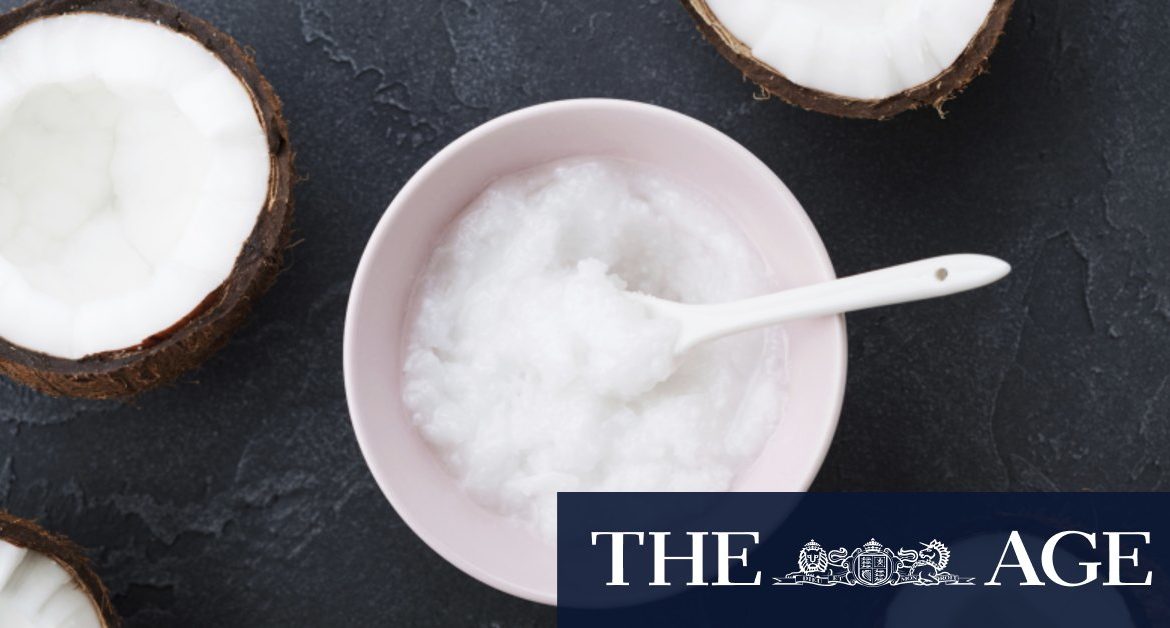First, let’s examine exactly what it is. Coconut oil is not really an oil, at least not at room temperatures for most people living in the Northern Hemisphere. It’s more like butter or beef fat, solid when cold. That’s the first clue to the fact that, unlike most other oils derived from plants that primarily contain unsaturated fatty acids, coconut oil is a highly saturated fat, 87 per cent saturated, in fact, far higher than butter (63 per cent) or beef fat (40 per cent). Most experts recommend limiting saturated fats, which can drive up cholesterol levels and lead to clogged arteries.
Nor is coconut oil a diet food. Like other vegetable oils, a tablespoon of coconut oil supplies 117 calories, 15 more than a tablespoon of butter.
Perhaps you’ve heard the claim that the primary fatty acid in coconut oil, called lauric acid, doesn’t act like a saturated fat in the body. Not true. Its action most closely mimics that of beef tallow and butter, both of which can promote atherosclerotic heart disease.
To better understand how coconut oil behaves when ingested, I consulted two experts, Dr Frank M. Sacks, nutrition and cardiovascular disease specialist at Harvard’s T.H. Chan School of Public Health, and Dr Philip Greenland, professor of cardiology at the Feinberg School of Medicine in Chicago.
“It’s been known for a long time that coconut oil raises blood levels of artery-damaging LDL cholesterol, and the newest research has strengthened that early understanding,” Sacks said. In preparing an editorial published last March in the journal Circulation, he said, “I could find nothing in the scientific literature to support advertising claims that coconut oil has some beneficial effects.”
Greenland echoed that assessment, stating that “the marketing of coconut oil is confusing. It’s trying to sell it as a healthy fat, but those who know its composition don’t think that at all.”
One claim made for coconut oil is undisputed: It can raise blood levels of HDL cholesterol, which has long been thought to protect against heart disease. However, a clear-cut health benefit of HDL cholesterol has yet to be demonstrated in people. As Sacks reported, “Genetic studies and HDL-raising drugs have not so far supported a causal relationship between HDL cholesterol and cardiovascular disease. HDL is composed of a huge array of subparticles that may have adverse or beneficial actions. It is unknown which, if any, foods or nutrients that raise HDL cholesterol do so in a way that reduces atherosclerosis and coronary events.”
Ditto, said Greenland. “Efforts to raise HDL have not led to beneficial clinical improvements.”
Proponents are also fond of citing the fact that a number of Indigenous populations — including Polynesians, Melanesians, Sri Lankans and Indians — consume rather large amounts of coconut products without suffering high rates of cardiovascular disease. However, most of these people have traditionally eaten coconut flesh or squeezed coconut cream as part of a diet that is low in processed foods and rich in fruits and vegetables, with fish as the main source of protein. They are also far more active physically than typical Westerners.
But even that is now changing, a New Zealand research team reported, with the “imports of unhealthy foods such as corned beef, fast food and processed ingredients, leading to huge increases in obesity and poor health.”
The team’s review of 21 studies of coconut oil consumption prompted the conclusion that consuming coconut products that contain fibre, such as coconut flesh and flour, in a diet rich in polyunsaturated fats and absent in excessive calories from refined carbohydrates would not pose a risk for heart disease. But the researchers found no evidence that could justify substituting coconut oil for other unsaturated plant oils.
Or as Nestle put it, “If you like the way it tastes, in limited amounts it’s fine, but it’s by no means a superfood.” However, she added, if you want to use coconut oil on your hair or skin, no problem.
New York Times
Get a little more outta life
Start your week with practical tips and expert advice to help you make the most of your personal health, relationships, fitness and nutrition. Sign up to our Live Well newsletter sent every Monday.
Most Viewed in Lifestyle
Loading







